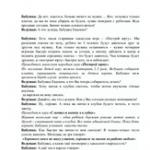12.02.2016 03:39
In all adults, somewhere deep inside there lives a child, as they once were.
When we are relaxed and in a good mood, we sometimes want to joke and fool around. And there's nothing wrong with that. On the contrary, it's even great. But sometimes this inner child manifests itself in inappropriate situations, and we begin to want to be small again, so much so that this creates some difficulties.
Here we will talk a little about child behavior in adults. About why adults have thoughts like “I want to go back to childhood,” where the desire to behave like little ones comes from, and what to do about it.
What is the problem "I want to be a child"
Sometimes it happens that the child in us awakens in situations where we are stressed and it is difficult for us to face difficulties. In such cases, we sometimes begin to behave childishly, laugh off difficulties and avoid responsibility, i.e. Adults develop childlike behavior. The fact is that under conditions of stress, psychological defense mechanisms- hidden subconscious mechanisms that help us isolate ourselves from problems and reduce negative experiences to a minimum. There are many of these mechanisms, and one of them is regression- it is he who prompts a person to temporarily return, as it were, to an earlier stage of growing up.
If this happens to you sometimes, these impulses do not last long and do not create difficulties, then there is no need to worry about it. Everyone has psychological defense mechanisms - the human psyche has its own tricks on how to cope with stress, even if these methods are objectively inappropriate. But what to do if the “I want to be a child” state lasts for a long time?
If day after day you notice that instead of doing activities appropriate for your age, you want to watch cartoons and assemble construction sets, if for some reason you buy yourself soft toys and dolls, then that’s a different conversation. There are two reasons for this condition.
Causes child behavior in adults
1. You feel lonely and unprotected.
We all remember how simple life seemed to us when we were little and in the care of our parents. We could walk all day long, play and do what we wanted, without thinking about difficulties. We were protected from any adversity, taken care of and solved all our little problems - and therefore these same problems essentially did not exist in our lives. We felt safe, there was always someone strong next to us, who was ready to take responsibility for everything that happens in our lives, and therefore we felt good and calm. And, of course, we were simply pleased to feel the constant care and attention.
If you are experiencing something similar, then you should listen to yourself and pay more attention to yourself. Relax, take a vacation. Keep yourself away from your problems for a while. And, of course, take care of your personal life and reconsider yourrelationships with loved ones - it is obvious that this relationship does not suit you in some way if you feel a lack of love and attention.
Think about it—perhaps with your infantile behavior you are trying to attract attention to yourself, make your loved ones remember your existence and be more kind to you? Have a heart-to-heart talk with your family and explain your feelings. In some cases, it is much easier and more effective to talk once than to spend months trying to achieve something in ways that may be incomprehensible not only to your loved ones, but also to yourself.
2. The second reason for the experience “I want to be a child” has a completely different connotation. Think - isn't it time for you to have children?
When we play with children, we ourselves are immersed in the world of childhood and at these moments we become a little children. We play with toys with the kids, read children's books and sing songs for kids. But if you are an adult and you don’t have children yet, then it may happen that parental feelings can manifest themselves in this way. You go shopping and buy toys, not understanding why you are doing this - but the fact is that something inside is pushing you to buy these toys for... someone who is not yet near you.
If you are familiar with these feelings, then think about this topic more seriously. Of course, if you don't have children, there are reasons for this. But don’t ignore the fact that your subconscious wants you to have a baby so much that it’s directly screaming at you about it. Admit to yourself that you want a child, and allow yourself to think in this direction. Maybe your career can wait? And if it’s about your personal life... Well, it’s time to improve it in any case!
So, we have looked at the reasons that can push you into childish behavior and cause an adult to feel “I want to be a child, I want to be little again, I want to go back to childhood!” Which one is close to you is something only you can understand. How to solve this problem is up to you to think too. But remember that you will not be able to solve the problem until you understand the reason for its occurrence. Good luck to you!
Yours Anastasia Cherkasova, psychologist
WOMEN'S ONLINE MAGAZINE "100 WORLDS"
Specialists from the Center for Research on Contemporary Childhood at the Institute of Education of the National Research University Higher School of Economics said: What are the reasons why today's teenagers don't want to grow up?.
And this statement has good reason. The age for first marriage has increased by three years, and now young people do not want to get married before the age of 27, and girls do not want to get married before the age of 25. Young people do not want to leave parental care until they are 23-25 years old, believing that living with mom and dad until this age is quite normal and very convenient. About 10 years ago, children from the age of 18 strived for independence.
Experts in the field of sociology and child psychology argue that the reasons for slow maturation lie in education reform.
As before, those who choose military service after school, and then marriage, children, and family, grow up a little earlier. If a student goes to a university, and from there to a master’s or graduate school, then in principle he is not ready for early adulthood, because he becomes an “eternal student.”

Society is becoming more and more complex, routine mechanical labor is often replaced by machine labor, and therefore modernity requires a more intellectual approach from young people.
For this reason, there are fewer and fewer of those who go to work as drivers after the army without receiving an education, and more and more of those who, from school, are thinking about their future life, starting with entering a university.

Experts emphasized that the process of learning new things is inextricably linked with the feeling of childhood within oneself.
This is why adults absorb new knowledge so hard and difficult. Therefore, it is not surprising that modern children sometimes remain like this until they are 30 years old. Biological age can no longer be considered a sign of adulthood as such.
Childhood is a wonderful, carefree time when there is no need to follow moral principles, make serious decisions, or think about the future. Surely, sometimes you would like to be transported, even for a day, to that time when everything seemed so rosy and cloudless, the world was huge and beautiful, and your affectionate mother was always nearby. But parents are sometimes worried when an 11-year-old girl, instead of starting to be interested in cosmetics and boys, picks up her favorite doll and begins to come up with the plot of a new game. Or a boy of the same age, instead of going fishing or football, plays with cars or assembles Legos. Is there any cause for concern?
Delayed maturation or Peter Pan syndrome
The concept of Peter Pan syndrome was first described by American psychologist Dan Kiley. This is how he designated the state when a boy does not want to enter adulthood and childishness becomes his normal state. Moreover, very often it passes into adulthood, becoming a character trait of a person.
But this does not happen in all cases and there are not always serious reasons for alarm. The development of each child is individual, both physical and mental. So it is not always wise to rush to “pull” a child out of childhood - sooner or later, growing up will happen anyway.
When should you sound the alarm?
Observe your child and his behavior. If you don’t notice any abnormalities - speech impairments, information perception, logical thinking, building cause-and-effect relationships, then you have no reason to worry - the child is completely normal, he’s just not mentally ready to be an adult yet.
If the listed violations are present or you have repeatedly paid attention to the child’s inappropriate behavior, for example, the whims characteristic of three-year-old children, then you may need the help of a psychologist. And in most cases it turns out that the problem that has arisen lies not in the child himself, but in the error of upbringing. And again, this is not a deviation, but simply a behavioral tactic that you can still turn in the right direction.
Why doesn't a child want to grow up?
And now a little more about what reasons can delay a child’s psychological development, preventing him from becoming a reasonable adult. There are five main reasons.
If, as a very small child, the child was capricious and often got what he needed with tears and tantrums, and you did not pay enough attention to this problem, then it is possible that the current problem is connected with this. By the age of 7-10 years, a child already clearly understands the beauty of childhood - you can do nothing, easily get everything you want and tries to delay this time, choosing exactly the model of behavior that was most effective. And childishness begins again, childish scandals, hysterics, blackmail. In this case, you need to firmly make it clear to the child that such behavior is unacceptable at his age and will not lead to any results.
Very often, the basis of delayed maturation is excessive parental care. Indeed, why become independent if your mother will still decide everything for you, tell you what is best to do, or even do everything for you? Even lessons, if you try really hard. Tight, vigilant control over a child does not discipline him at all. This is a very common parenting mistake. The only thing that can be achieved using this model of education is the denial of independence. Why does this happen?
If a child feels constant control over himself, then he may have a fear of making a mistake and causing annoyance and discontent of those who are infinitely dear to him. And the child shifts decision-making to a person who is smarter in his opinion - sister, brother, mom or dad, or puts this question off altogether, throwing it out of his head for a long time.
Teach your child not to be afraid of difficulties, learn to respect any of his decisions. If it is not correct, then you should not criticize it - it is better to gently point out the mistakes to the child, describe the possible consequences and ask him to think again. Ask him more questions, like an adult - “What do you think? What do you want? How do you think?" Ask and take into account his opinion.
The situation is much worse when a child tries to transfer his guilt onto others, being afraid to experience it himself. He attributes all his mistakes and actions to others, trying to reduce his own mistakes by avoiding responsibility. If you do not make it clear to the child in time that this should not be done under any circumstances, then this character trait will carry over into adult life and thoroughly spoil it.
Try to give your child more independence, praise him when he makes the right decision, and make him feel the full burden of responsibility for his careless words and actions.
What to do if a child does not want to grow up?
If a child behaves completely normally and the reluctance to grow up manifests itself in innocent childishness that does not harm either him or others, then nothing needs to be done. Your child simply has not yet played enough with toys and is not ready for adulthood. Give him some time.If growing up has taken too long, then show him to a psychologist - a sincere conversation and a series of psychological tests will help you find out whether his childishness is a deviation from the norm.
Provide your child with a number of simple tasks that he needs to perform daily. For example, throwing out the trash or washing the dishes. He must know that this is exclusively his business and no one will do it for him.
Give him more independence, do not make decisions for him, but encourage him to make them with leading questions.
Give him the right to choose, do not insist on your decision if it is not critical. For example, if your child does not want to learn to play the piano, then you should not force him to do it. Let him choose something he likes.
In the vast majority of cases, parents’ anxiety is unjustified and when the time comes, the child grows up on his own. So don't worry ahead of time, but don't ignore it either.





